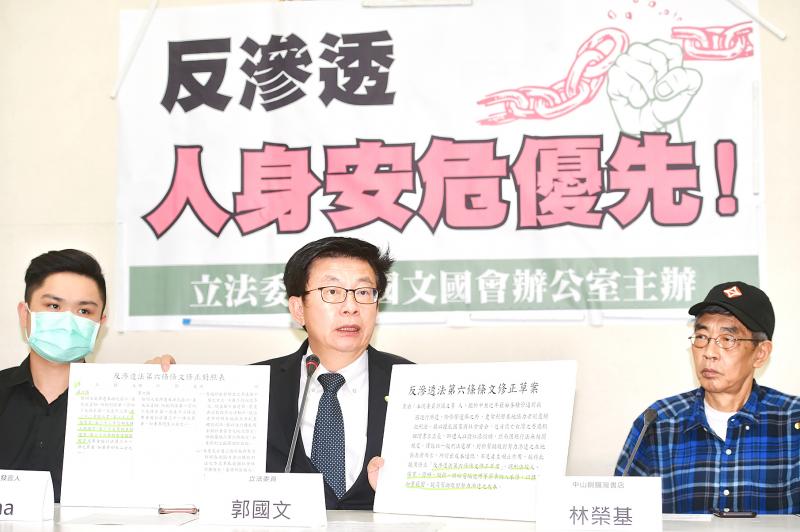The Anti-infiltration Act (反滲透法) is not stringent enough to deter people from aiding foreign forces attempting to infiltrate Taiwan, Democratic Progressive Party Legislator Kuo Kuo-wen (郭國文) said yesterday as he proposed an amendment to better safeguard national security.
As the act focuses on offenses during an election or when large crowds gather, but not individual attacks, some Taiwanese accomplices of foreign forces can only be held accountable under the Criminal Code, which does not stipulate adequate punishment to deter infiltration efforts, Kuo told a news conference in Taipei, citing cases in which Taiwanese allegedly operating at the behest of Beijing attacked Hong Kongers in Taiwan.
Democracy advocate Joshua Wong (黃之鋒) was attacked in 2017, while red paint was thrown on singer Denise Ho (何韻詩) and former Hong Kong Causeway Bay Books manager Lam Wing-kei (林榮基) last year and last month respectively, he said.

Photo: Fang Pin-chao, Taipei Times
The recurrence of violent acts in the nation show that the legal consequences for such behavior are too lenient, putting people’s personal safety at risk, he added.
Article 6 of the act — which lists the types of crimes subject to increased penalties when committed under the influence of infiltration sources — should be amended to include the parts of the Criminal Code covering murder, intimidation and harming others, as well as cybersecurity offenses, Kuo said.
Lam, who also attended the news conference, said that “unfortunately, the act is not complete,” which is why those who attacked him, Wong and Ho were released shortly after their crimes on human rights grounds.
“How about the human rights of the people who were attacked?” Lam asked.
Hong Kong Outlanders spokesman Kuma Yung said that the attacks remind people that they cannot assume that they are completely safe just because they are in Taiwan.
Although the attacks targeted public figures, it does not mean that members of the general public are not exposed to threats and the infringement of their human rights by foreign forces, Yung said.
Passage of the amendment would truly enhance the security and rights of Hong Kong pro-democracy activists when they visit Taiwan, Kuo said.
Additional reporting by CNA

Chinese Nationalist Party (KMT) Chairman Eric Chu (朱立倫), spokeswoman Yang Chih-yu (楊智伃) and Legislator Hsieh Lung-chieh (謝龍介) would be summoned by police for questioning for leading an illegal assembly on Thursday evening last week, Minister of the Interior Liu Shyh-fang (劉世芳) said today. The three KMT officials led an assembly outside the Taipei City Prosecutors’ Office, a restricted area where public assembly is not allowed, protesting the questioning of several KMT staff and searches of KMT headquarters and offices in a recall petition forgery case. Chu, Yang and Hsieh are all suspected of contravening the Assembly and Parade Act (集會遊行法) by holding

PRAISE: Japanese visitor Takashi Kubota said the Taiwanese temple architecture images showcased in the AI Art Gallery were the most impressive displays he saw Taiwan does not have an official pavilion at the World Expo in Osaka, Japan, because of its diplomatic predicament, but the government-backed Tech World pavilion is drawing interest with its unique recreations of works by Taiwanese artists. The pavilion features an artificial intelligence (AI)-based art gallery showcasing works of famous Taiwanese artists from the Japanese colonial period using innovative technologies. Among its main simulated displays are Eastern gouache paintings by Chen Chin (陳進), Lin Yu-shan (林玉山) and Kuo Hsueh-hu (郭雪湖), who were the three young Taiwanese painters selected for the East Asian Painting exhibition in 1927. Gouache is a water-based

Taiwan would welcome the return of Honduras as a diplomatic ally if its next president decides to make such a move, Minister of Foreign Affairs Lin Chia-lung (林佳龍) said yesterday. “Of course, we would welcome Honduras if they want to restore diplomatic ties with Taiwan after their elections,” Lin said at a meeting of the legislature’s Foreign Affairs and National Defense Committee, when asked to comment on statements made by two of the three Honduran presidential candidates during the presidential campaign in the Central American country. Taiwan is paying close attention to the region as a whole in the wake of a

OFF-TARGET: More than 30,000 participants were expected to take part in the Games next month, but only 6,550 foreign and 19,400 Taiwanese athletes have registered Taipei city councilors yesterday blasted the organizers of next month’s World Masters Games over sudden timetable and venue changes, which they said have caused thousands of participants to back out of the international sporting event, among other organizational issues. They also cited visa delays and political interference by China as reasons many foreign athletes are requesting refunds for the event, to be held from May 17 to 30. Jointly organized by the Taipei and New Taipei City governments, the games have been rocked by numerous controversies since preparations began in 2020. Taipei City Councilor Lin Yen-feng (林延鳳) said yesterday that new measures by